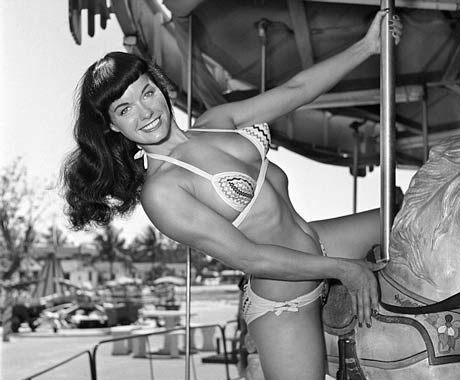Pin-up superstar Bettie Page tells her own story in Mark Mori's fine biographical documentary. The brunette bombshell with the trademark bangs recorded the narration of this authorized biography before she passed in 2008. In authorized biographies, subjects typically airbrush unflattering wrinkles such as mental illness, sexual assault and broken marriages out of their lives, but Page recalls all these painful memories, which injects this film with authority and immediacy.
We never see the elderly Page on screen, but it's startling to hear her gravelly Southern drawl explain how her father used to molest her and rape two of her sisters. Page grew up dirt poor. After failing to break into Hollywood and divorcing an abusive husband, she fled to New York, where the fashion industry rejected her too-shapely body. Instead, an off-duty cop discovered Page, invited her to become a cheesecake model and, perhaps most importantly, recommended that she grows bangs which forever became her trademark.
Page became the top model in postwar America, posing for camera clubs where guys photographed chicks wearing saucy swimsuits or less. Hugh Hefner and several photographers say the same thing: Page projected a powerful combination of sexiness and innocence, whether she was wearing a handmade bikini or bondage gear.
'50s America was a repressive place, and Irving and Paula Klaw, who took Page's iconic bondage photos, were driven out of business by Washington. Page left the business, found Jesus and remarried, but lapsed into mental illness. Meanwhile, the cult of Page grew over the years as comic book artists, painters, fashion designers and young women exalted her as a fashion icon and sexual feminist.
Mori does his homework, detailing the glamour years through on-camera and audio interviews with former lovers and photographers including Klaw and Bunny Yeager; Page's later years are documented by Page authority Greg Theakston and artists Olivia de Berardinis, Dave Stevens and David Blue. The film generously showcases photos and films of Page, some of them never seen before, and evokes the eras with stock footage.
The main attraction, however, is Page's narration. Despite some painful memories, she often laughs, which echoes the playful nature found in her photos. In Mori's film, Bettie Page finally gets the cinematic treatment she deserves.
(Films We Like)We never see the elderly Page on screen, but it's startling to hear her gravelly Southern drawl explain how her father used to molest her and rape two of her sisters. Page grew up dirt poor. After failing to break into Hollywood and divorcing an abusive husband, she fled to New York, where the fashion industry rejected her too-shapely body. Instead, an off-duty cop discovered Page, invited her to become a cheesecake model and, perhaps most importantly, recommended that she grows bangs which forever became her trademark.
Page became the top model in postwar America, posing for camera clubs where guys photographed chicks wearing saucy swimsuits or less. Hugh Hefner and several photographers say the same thing: Page projected a powerful combination of sexiness and innocence, whether she was wearing a handmade bikini or bondage gear.
'50s America was a repressive place, and Irving and Paula Klaw, who took Page's iconic bondage photos, were driven out of business by Washington. Page left the business, found Jesus and remarried, but lapsed into mental illness. Meanwhile, the cult of Page grew over the years as comic book artists, painters, fashion designers and young women exalted her as a fashion icon and sexual feminist.
Mori does his homework, detailing the glamour years through on-camera and audio interviews with former lovers and photographers including Klaw and Bunny Yeager; Page's later years are documented by Page authority Greg Theakston and artists Olivia de Berardinis, Dave Stevens and David Blue. The film generously showcases photos and films of Page, some of them never seen before, and evokes the eras with stock footage.
The main attraction, however, is Page's narration. Despite some painful memories, she often laughs, which echoes the playful nature found in her photos. In Mori's film, Bettie Page finally gets the cinematic treatment she deserves.




